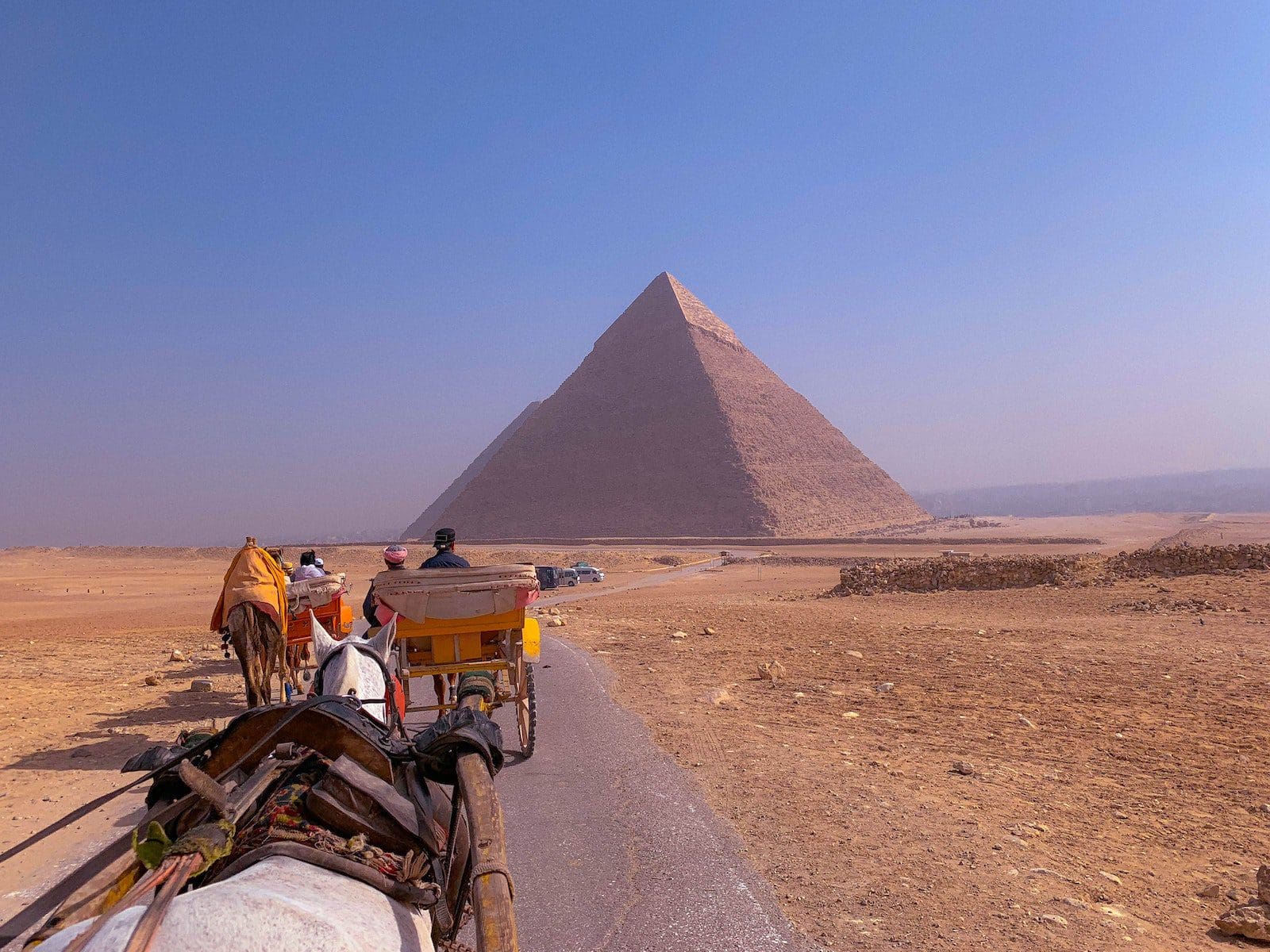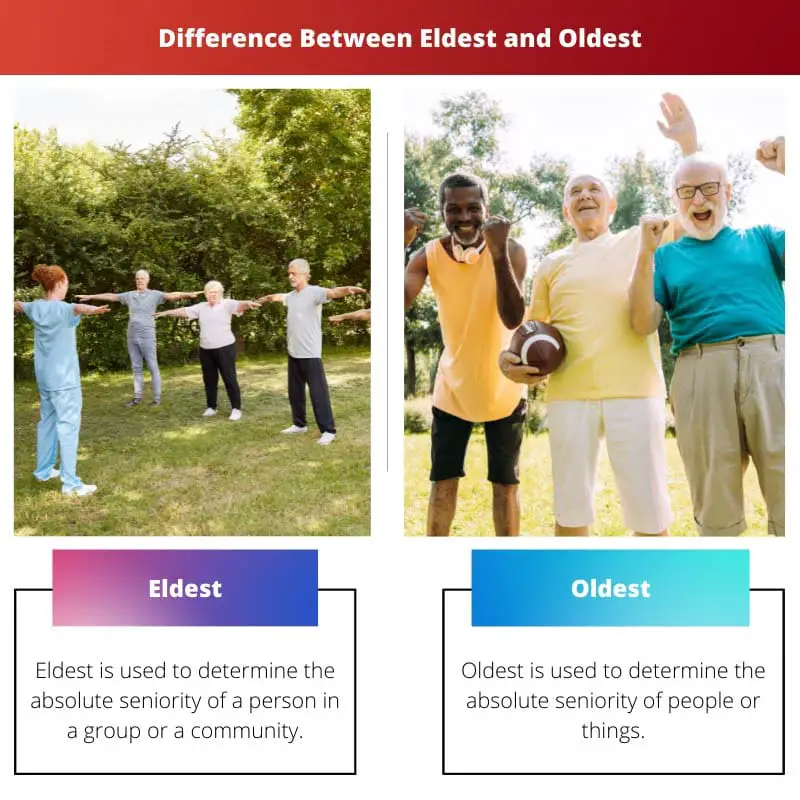“Eldest” typically refers to the firstborn or the oldest individual in a family or group, implying a hierarchical position based on age. It’s a descriptive term indicating seniority within a familial or social structure.On the other hand, “oldest” can refer more broadly to the individuals or objects that have been in existence the longest within a certain context, without necessarily implying a hierarchical order based on birth or age.
Key Takeaways
- Eldest refers to the firstborn or earliest in a sequence among siblings; oldest describes the highest age or the longest duration of existence.
- Eldest is used exclusively for people within a family context; oldest can be applied to people, objects, or concepts.
- Both eldest and oldest indicate seniority or precedence, but eldest is specific to sibling relationships, while oldest has broader applications.
Eldest vs Oldest
The term “eldest” refers to someone who is the oldest among siblings or related individuals. “Oldest” is a more general term and can be used to refer to the seniority of a person, object, or idea in any group, not strictly limited to familial relationships.

Both terms are superlative adjectives, as absolute attributes of an individual, a group, or a community. These denote seniority in age and birth order.
Examples
- Geeta is the eldest of eight siblings.
- The eldest lawyer in our firm will retire tomorrow.
- The Akkadian Empire is the oldest in the world.
Comparison Table
| Feature | Eldest | Oldest |
|---|---|---|
| Meaning | Refers to the firstborn in a family or group of related individuals. | Refers to the one who is the greatest in age in a group, regardless of relation. |
| Usage | Primarily used with people but can be used figuratively with things. | Can be used with both people and things. |
| Comparison | Compares individuals within a specific group. | Compares individuals or things across a broader group. |
| Comparative form | Elder | Older |
| Superlative form | Eldest | Oldest |
| Examples | * “He is the eldest of the five siblings.” * “The eldest son inherited the family estate.” (Figurative: “The cathedral is the eldest building in the city.”) | * “She is the oldest person in the town.” * “This is the oldest book in the library. |
Who is Eldest?
Introduction to Eldest
The term “eldest” typically refers to the individual who is the oldest or firstborn among siblings within a family. In many cultures and societies, the concept of eldest carries significant social, cultural, and sometimes legal implications. Understanding the role and significance of the eldest individual within a family structure provides insight into broader patterns of inheritance, authority, and familial relationships.
The Role of the Eldest
1. Inheritance and Succession
- In societies with primogeniture traditions, the eldest child often inherits a greater share of the family’s wealth, property, or titles compared to younger siblings.
- This practice reflects a cultural belief in the primacy of the firstborn and their responsibility to carry on the family legacy or lineage.
2. Leadership and Authority
- The eldest sibling may assume a leadership role within the family, serving as a role model, mentor, or mediator for younger siblings.
- They may be entrusted with greater responsibilities and decision-making authority, especially in matters concerning family affairs or business matters.
3. Symbol of Tradition and Continuity
- The eldest child is often regarded as a symbol of tradition and continuity within the family lineage.
- They may be expected to uphold family customs, values, and traditions, preserving the cultural heritage passed down through generations.
4. Protector and Caretaker
- The eldest sibling may take on the role of protector and caretaker for younger siblings, offering guidance, support, and assistance when needed.
- This responsibility extends beyond childhood and may continue into adulthood, especially in cultures where strong familial bonds and intergenerational support are valued.
Cultural Variations and Interpretations
- The significance of the eldest varies across cultures and societies, influenced by factors such as religious beliefs, customary practices, and legal frameworks.
- In some cultures, such as those with matrilineal descent systems, the eldest daughter may hold a prominent position within the family hierarchy.
- Modern trends towards egalitarianism and individual autonomy may challenge traditional notions of primogeniture and the privileged status of the eldest.

Who is Oldest?
Introduction to Oldest
The term “oldest” typically refers to the individual who has lived the longest or has the earliest birthdate among a group of people, such as siblings, relatives, or colleagues. While the concept of oldest may seem straightforward, its implications can vary depending on the context and cultural norms. Understanding the role and significance of the oldest individual within different social settings provides insight into notions of seniority, experience, and authority.
The Role of the Oldest
1. Seniority and Experience
- The oldest individual is often regarded with respect and deference due to their seniority and accumulated life experiences.
- Their longevity may be seen as a source of wisdom, knowledge, and guidance for younger generations, making them valued members of their community or social group.
2. Leadership and Mentorship
- In familial or professional settings, the oldest individual may assume leadership roles or mentorship responsibilities.
- Their experience and maturity may qualify them to provide guidance, advice, and support to younger siblings, colleagues, or peers.
3. Family Dynamics
- Within the family unit, the oldest sibling may play a significant role in maintaining family cohesion and harmony.
- They may act as a mediator during conflicts, serve as a caregiver for elderly parents, or take on responsibilities related to family traditions and rituals.
4. Cultural Perceptions and Respect
- Across different cultures, the oldest individual may be accorded particular respect and reverence, reflecting cultural norms surrounding age and seniority.
- Traditional societies often value the wisdom and authority of elders, elevating the status of the oldest members within the community.
Variations in Seniority
- The concept of oldest can vary depending on the specific context and cultural norms.
- In some cultures, chronological age is the primary determinant of seniority, while in others, factors such as gender, social status, or achievements may also influence perceptions of seniority.
- Modern societies may challenge traditional notions of seniority, emphasizing meritocracy and equality over age-based hierarchies.

Main Differences Between Eldest and Oldest
- Eldest:
- Refers specifically to the firstborn or oldest sibling within a family.
- Often carries implications related to inheritance, leadership, and tradition within familial structures.
- Signifies the individual with the earliest birthdate among siblings, regardless of gender or context.
- Typically associated with familial roles and responsibilities, such as caretaking and leadership within the family unit.
- Oldest:
- Denotes the individual who has lived the longest or has the earliest birthdate among a group of people.
- Can apply to individuals within various social settings beyond the family, such as colleagues, friends, or community members.
- Emphasizes seniority, experience, and wisdom accrued over time.
- May be regarded with respect and authority due to their accumulated life experiences and maturity, regardless of birth order.


The distinction between ‘eldest’ and ‘oldest’ in terms of application and context is delineated meticulously in this article. The narrative is quite engaging.
The illustration of ‘eldest’ and ‘oldest’ through the ‘Eldest vs Oldest’ and ‘Who is Eldest?’ and ‘Who is Oldest?’ sections is commendable. A comprehensive analysis!
The precise delimitation of ‘eldest’ and ‘oldest’ in the ‘Main Differences Between Eldest and Oldest’ section delineates the various aspects of these words meticulously. Highly informative content.
The comparison table is very helpful to differentiate the subtle differences between the two words. This is a really informative article!
Yes, it provides a clear understanding of the nuances that distinguish ‘eldest’ from ‘oldest’. Great piece of information!
I found the article to be a perceptive and articulate examination of ‘eldest’ and ‘oldest’, unraveling their differences with utmost clarity.
The comparison between ‘eldest’ and ‘oldest’ presented in this article is thorough and logically structured. It enhances my comprehension of these terms.
The article captures the essence of ‘eldest’ and ‘oldest’ aptly, offering valuable insights into their usage and implications. A very enlightening read!
This is a compelling elucidation of the disparities between ‘eldest’ and ‘oldest’. I appreciate the clarity provided in this article.
This is a comprehensive and illuminating elucidation of the distinctions between ‘eldest’ and ‘oldest’.
The examples provided for both ‘eldest’ and ‘oldest’ are very illustrative and make it easier to comprehend the differences.
Absolutely! The examples really solidify the explanation given in the article. Well-articulated content.